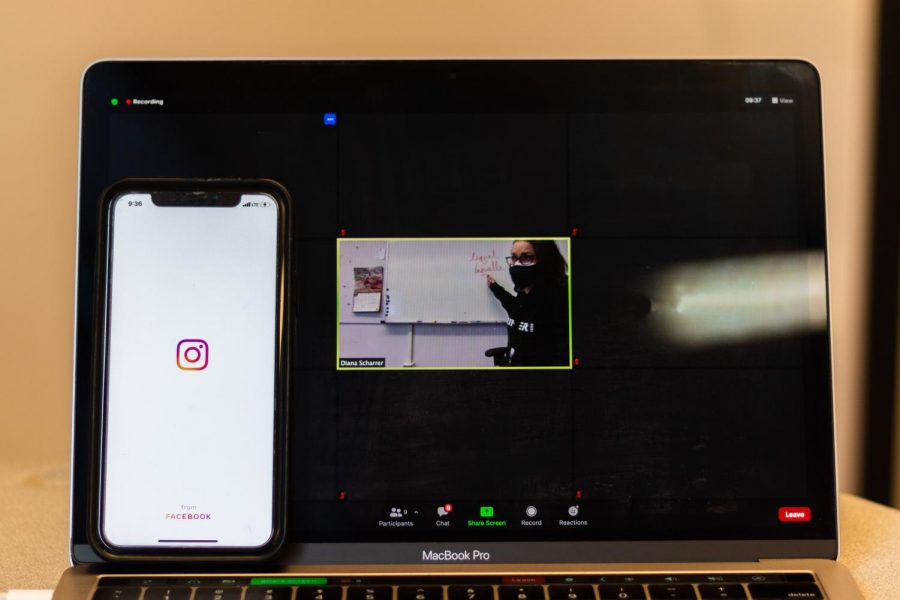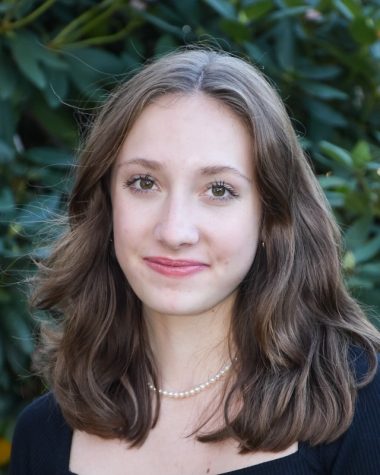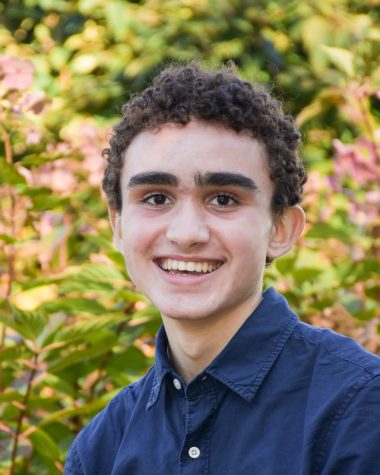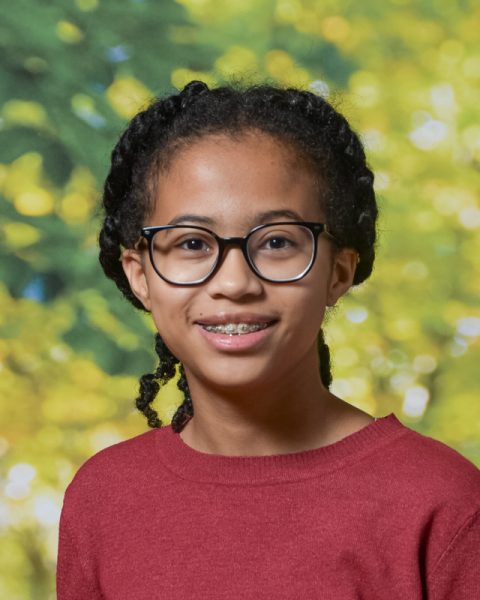Students, Teachers Debate Camera Requirements on Zoom
The Zoom camera has become an unexpected burden to students, with some opting to visually isolate themselves.
Students can decide on turning cameras on or off during remote learning. Photo illustration by Edan Zinn ’23.
February 24, 2021
Nearly a year after the School’s transition to in-person and concurrent learning platforms, students and teachers alike are still navigating the ups-and-downs of having Zoom cameras turned on or off.
The topic has provoked mixed feelings. While some students acknowledge the importance of cameras for class participation, others say that it hurts their learning.
“It’s often distracting to look at one’s own face. It’s like looking into a mirror,” Yutong Zou ‘22 said. “But it is also really weird to have everyone looking at you while you are sitting in a private space like your bedroom.”
According to Upper School Upper Head Joshua Neudel, the School has modified its stance on cameras since the spring.
“As we learned more about the online learning experience and teaching experience, we know that there are benefits for cameras on, but that there are also many triggers for students when a camera is forced to be on,” Neudel said. “In the end it came down to a conversation about equity, which is why we do not have a policy that requires cameras to be on. We strongly encourage cameras to be on and ask that students and teachers communicate with each other respectively about why a camera may be off or why it is being asked to be turned on at a given moment.
Zou’s concerns are echoed in a article from The Stanford Daily, which explains how Zoom fatigue is “intensified by the feeling of being looked at while also looking at themselves.”
Emma Guevara ‘23 acknowledged this discomfort.
“When the School first began using Zoom, I felt so uncomfortable keeping my camera on because it feels like everyone is staring at you,” Guevara said. “Because of this, I would pay more attention to my actions, the way I positioned my hands, or the way I was sitting. It ended up being even more of a distraction because that’s all I would focus on.”
Quinn Nielsen ‘23 shared a different perspective.
“Personally, I do not have a problem with turning my video on, but I can understand why some people do not feel comfortable showing their rooms or personal spaces,” Nielsen said. “I, too, would rather have my video off when I am home to enjoy my privacy, but I understand that the teachers don’t want to be teaching to black screens.”
A recent Wall Street Journal article reported that most discomfort in virtual settings stems from a lack of control over one’s appearance.
In an in-person meeting, “we choose seats, move chairs, and adjust our distance to stay comfortable. On computer screens, ‘personal space’ is determined by the size of the face image and how far you sit from the screen,” the article reads.
While Nielsen and Zou relate to this discomfort, Kai Wen ‘22 expressed a different view on why students chose to turn off their cameras.
“I believe that most of my classmates that turn off their cameras are doing something else,” Wen said.
Wen said that although some teachers ask students to turn on their cameras during class, there are workarounds.
“I have seen students leaning their laptop upwards so it only captures their forehead and the teachers cannot see what they are doing,” Wen said.
The School does not have a uniform policy when it comes to cameras being turned on or off. Some teachers have adopted more lenient policies to accommodate their students, like Middle and Upper School Spanish Teacher Katherine Poulson.
“I would love to see all of my students’ faces on Zoom every day,” Poulson said. “As a teacher, it is no fun talking to a sea of black squares all day. However, I tend to have a more lenient policy because I see the cameras on/off debate as an equity issue.”
Unsure of her students’ at-home experiences—possible anxiety, lack of a private or quiet space, or wifi instability—Poulson hopes to provide the most supportive learning environment in her classes.
“At the same time, I am not naïve,” Poulson said. “I know that for some students having the camera off is a chance to zone out or do other things such as walk away from the computer. And yes, it is frustrating when students take advantage of my leniency with cameras. Unfortunately, I have to pick my battles this year.”

Upper School English teacher Donald Reese shared that he is often frustrated when students are not visible on scree
“The only thing I hate more than looking at a screen full of nameplates is having to repeatedly ask people to turn on their cameras,” Reese said.
Reese said that the issue of cameras in virtual classes is one of the most challenging aspects of distance learning.
“I often ask students at the beginning of class to turn on their cameras when we are having a discussion, but not all do,” he said. “I wish students would show their faces because there is no way of knowing whether they are listening or understanding or even engaged at all with the class [if their cameras are off].”
As a result, it is difficult for teachers to determine how to make material more engaging, according to Reese.
“It just seems like common courtesy to show your face rather than lurk behind a plaque of your name, which just feels unfriendly,” Reese said.
According to Upper School Dean of Students Paul Murray, students should be left to decide for themselves about their cameras.
“A year into all of this, we should be approaching Zoom and other student issues through the lens of kindness and compassion,” Murray said.
Editors’ note: Due to editorial oversight, the original photograph which accompanied this article violated our ethical standards. The Gator should have photoshopped out the of names of students with their cameras turned off. The editorial board apologizes to the students, the teacher, and to the community for this unfortunate lapse in judgement. We pledge to be more mindful in the future, and we hope to regain your trust.
























































